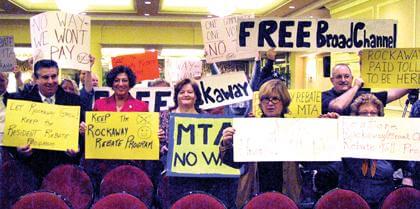By Philip Newman
For more than four hours last week Queens transit riders told the MTA what they thought of the its doomsday plan of fare hikes and service cuts during an often boisterous evening in Flushing.
The loudest opposition came from a large Rockaways contingent, who chanted, shouted and applauded while displaying placards denouncing the Metropolitan Transportation Authority plan to restore an intra−community toll on a bridge in Broad Channel.
The hearing, the second of eight held by the MTA, may not have reached the unruly level of the first hearing in Manhattan, when MTA officials were shouted down, but the Flushing audience was frequently unruly.
A threatened 23 percent fare increase on subways and buses as well as crippling service cuts that could eliminate the Z and W subway lines were not the only topics of criticism.
No less than a dozen speakers lambasted transit officials for scheduling the hearing on Inauguration Day, with one man finding it “actually un−American.”
Community leaders who attended the hearing were equally outraged.
“I am distressed that this hearing is being held the same day that a new chapter is being written in the pages of our nation’s history,” said Queens Borough President Helen Marshall at event in the Sheraton Flushing Hotel.
“Many hardworking New Yorkers who did not have the opportunity to watch today’s historic inauguration are rushing home to view the day’s newscasts and celebrate the wonder of our great democracy,” Marshall said. “They are among those who are not here. Do not take their absence as acceptance.”
Marshall also denounced the MTA plan to eliminate seven Queens bus routes: the Q26, Q56, Q74, Q75, Q84, QM22 and QM23.
While many Queens transit patrons loudly scolded the MTA with words like “shame” and “outrage” to describe the MTA fare increase for disabled and elderly users of Access−A−Ride, David McKinnon of Bayside, sitting in his wheelchair, said it was a good service at a good price.
Speaking in a soft voice, McKinnon said, however, that under the proposed increase “if you use it to get to work, to church, to shop, it’s going to be expensive. Is there any other way to save money?”
Outbursts from some of those waiting to speak frequently interrupted the decorum of the hearing.
State Assemblywoman Grace Meng (D−Flushing) was speaking when Douglas Sussman, MTA director of community affairs, interrupted her.
“Please conclude your remarks,” Sussman said. “Your time is up.”
“The clock was not set right,” shouted a member of the audience. “She’s still got a minute and a half.”
“Let her speak, Douglas,” called another.
Smiling, Sussman yielded the floor, setting off applause and Meng resumed.
City Councilman Tony Avella (D−Bayside) called for the state Legislature to enact his proposed legislation to remove the subway and bus systems from state control in favor of the city.
Gene Russianoff, attorney for the transit advocacy group Straphangers Campaign, said he was appalled at some of the MTA’s service cutback plans.
“Your service reductions would have a devastating impact on thousands of northeast Queens residents, who depend on these bus routes as their primary means of transportation between school, work and other activities,” Russianoff said.
Michelle Anderson, dean of the CUNY School of Law, said: “I implore you not to eliminate Q74 bus service. It is the sole link between the subway system and the CUNY School of Law, as well as Queens College. Eliminating this line would result in hardship for our students, faculty, staff and visitors.”
The MTA has said all along it hopes never to have to impose the service cuts and drastic fare hikes, but faces at $1.2 billion budget gap. The agency is hoping for major financial help from the state Legislature by March, when the cutbacks would begin.
Any fare increases would take place in late spring.
Reach contributing writer Philip Newman by e−mail at news@timesledger.com or phone at 718−229−0300, Ext. 136.


































